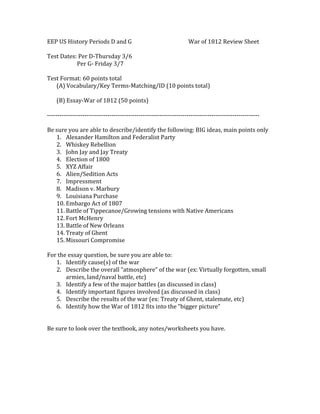Eep us history periods d and g review sheet
- 1. EEP US History Periods D and G War of 1812 Review Sheet Test Dates: Per D-Thursday 3/6 Per G- Friday 3/7 Test Format: 60 points total (A) Vocabulary/Key Terms-Matching/ID (10 points total) (B) Essay-War of 1812 (50 points) -----------------------------------------------------------------------------------------------------Be sure you are able to describe/identify the following: BIG ideas, main points only 1. Alexander Hamilton and Federalist Party 2. Whiskey Rebellion 3. John Jay and Jay Treaty 4. Election of 1800 5. XYZ Affair 6. Alien/Sedition Acts 7. Impressment 8. Madison v. Marbury 9. Louisiana Purchase 10. Embargo Act of 1807 11. Battle of Tippecanoe/Growing tensions with Native Americans 12. Fort McHenry 13. Battle of New Orleans 14. Treaty of Ghent 15. Missouri Compromise For the essay question, be sure you are able to: 1. Identify cause(s) of the war 2. Describe the overall “atmosphere” of the war (ex: Virtually forgotten, small armies, land/naval battle, etc) 3. Identify a few of the major battles (as discussed in class) 4. Identify important figures involved (as discussed in class) 5. Describe the results of the war (ex: Treaty of Ghent, stalemate, etc) 6. Identify how the War of 1812 fits into the “bigger picture” Be sure to look over the textbook, any notes/worksheets you have.
- 2. Recall: 4 Major Battles of the War of 1812 1. Battle of Lake Erie (1813)  Naval battle fought in present day Ohio.  Commanded by Oliver Hazard Perry.  Perry and his fleet are able to defeat the British fleet.  United States is able to gain control of Detroit.  Forces the British to flee into Canada 2. Battle of York (1813)  Land battle fought in modern day Toronto.  Americans burned and trashed “everything British”  Britain upset about this, will look for revenge against the US.  Though an American victory, it holds no strategic advantage for the US 3. Battle of Bladensburg (1814)  Land battle fought in Maryland.  American troops outnumber British troops (total mismatch, on paper at least)  British forces are able to overcome and defeat the Americans.  The result is an American loss and a “wide open” Washington DC  British will look to move into Washington as revenge for the Battle of York Recall: The British burn Washington DC in 1814 (Dolley Madison) and look to move to Baltimore but are defeated at Ft. McHenry (F. Scott Key-Star Spangled Banner) 4. Battle of New Orleans (1814/1815)  Last major battle of the war.  Lead by General Andrew Jackson (future president)  British want control of New Orleans (Mississippi River, trade, etc)  British army consists of soldiers trained specifically for war.  Jackson’s militia-the complete opposite!  In essence, Jackson’s militia is every day citizens, farmers, African Americans.  On paper, it looks like it will be an easy victory for the British.  However, Jackson and his US militia kill over 2,000 British in about 25 minutes. US casualties were under 100.  Victory is seen as the end of the war. However, the war was over in December 1814 with the Treaty of Ghent (no communication)



